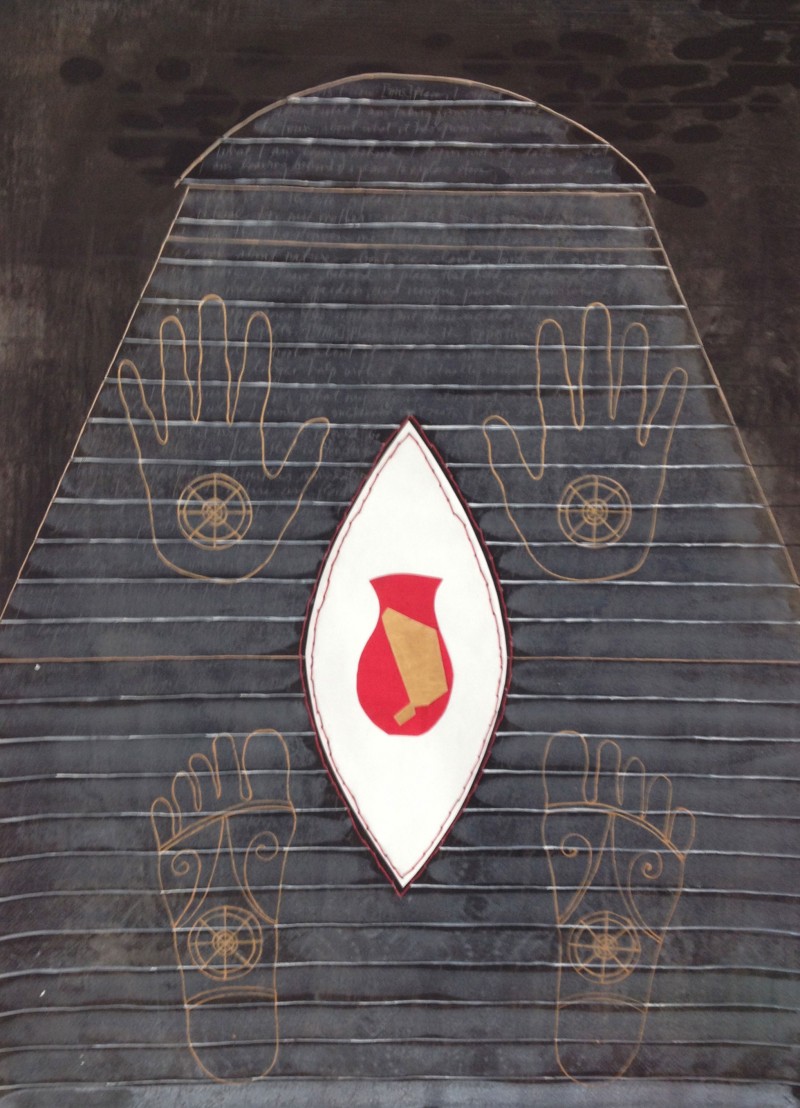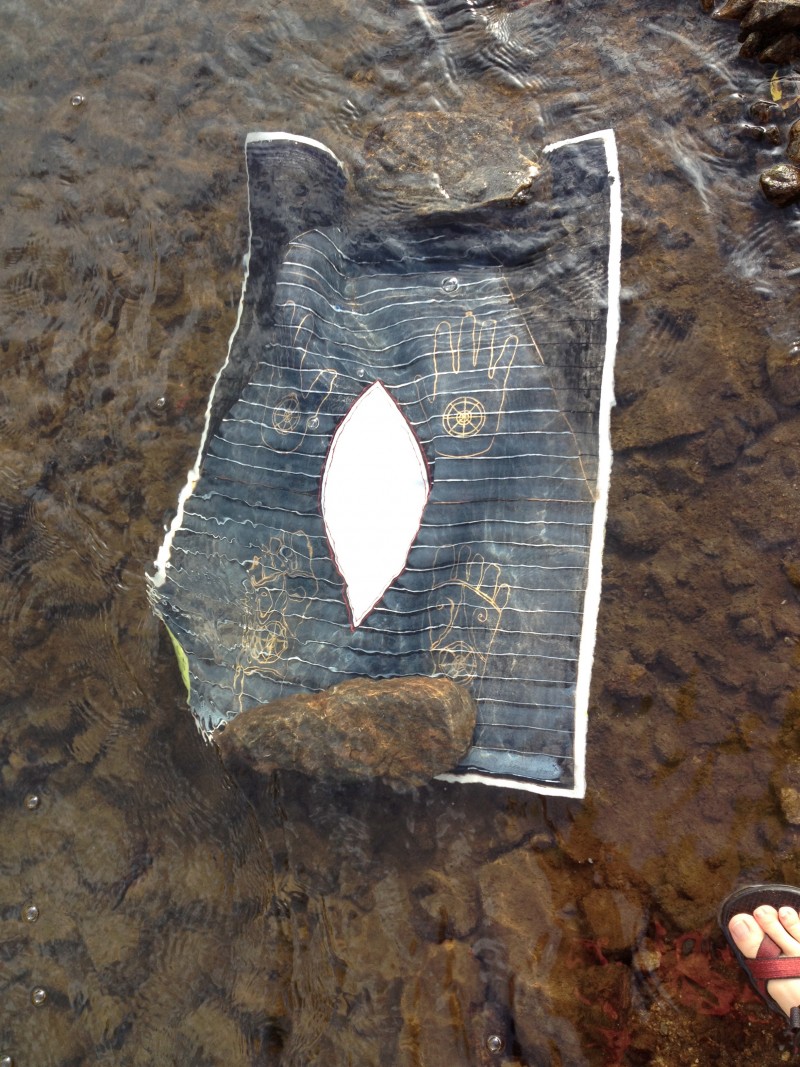Closing This Place: A Ritual in Parts
Performed September-October 2015
This multi-day ritual concerns the site in Jamestown, Colorado, which I called [THIS] Place, Ivydell, and 51 Main. Closing This Place is a celebration of the creative processes that my husband David Thorndike and I exercised there over more than 17 years, and a memorializing of the site. The ritual title alludes to Book of This Place: The Land, Art, and Spirituality, a 2009 book that I published about our first decade of work there. Here, I acknowledge all that I am leaving behind, what I am taking from it, and all that has been given to me. I describe a practice of letting go. At the end of this narrative are five photographs showing the transformation of one of several artifacts I created for this performance.
I leave behind a vision of the future.
- I leave behind a place where I could create a contemplative sculpture garden and undertake sustained meditation retreats.
- I leave behind a site built with David, though by 2013 he no longer had the strength or stamina to help with care of the site. There, he could age in place.
- I leave behind a site that gave me deep solace.
- I leave behind a place where I learned about nature. There I observed the seasons, watched ice grow on rocks in the James Creek, documented the sun’s arc across the cerulean sky, observed the play of clouds at 7000 feet, and swam in the Milky Way at night.
- I leave behind a medicinal garden, with paths and plants, fruit trees and flowers, and marble perches from which to observe and experience the world.
- I leave behind a place to carve stone and place sculptures on the site.
- I leave behind the place where I conducted rituals, including daily circumambulation on the paths, as well as Requiem for a Wasted Life, a 30-day ritual for my mother. The stone I carved for her, which I buried to the west of The Sisters outdoor sanctuary, was swept away during the flood along with the sanctuary itself.
- I leave behind many dreams and fantasies of what my old age would be.
- I leave behind proximity to many friends.
- I leave behind a place that is too big for me to take care of alone.
- I leave behind my own and David's fears of fire and flood.
Yet, I take so much with me.
- I am taking deep knowledge of the truth that everything is impermanent. Even stone is subject to the reality of impermanence.
- I am taking the capacity to hold experiences of suffering and to feel greater compassion for others who have lost or will lose as much or more than I have lost.
- There I learned what it means to be connected to the land, and to a particular place.
- I am taking the experience of being part of a mountain community.
- I am taking a sense of home: of what home means and knowledge about what it takes to create a home.
- I have given so much to the site and the community, and I have gotten so much back. I gave my heart, my body, my mind. I had imagined being there until death.
This period of my life with its visions, dreams, and fantasies has come to an end. This ritual is practice for dying. Admittedly, it is a small death, yet it is practice for death at the end of my life in this body and mind, in this place, in all places that I have known, and with all those I have loved. How could it be anything other than this?
Now I seek to release my holding onto all that I imagined. Now I seek to release my attachment to all of it: the site, the land, and living beside the James.
- I release my holding onto the place and all of my dreams and visions.
- I release my attachment to what was and to all of the prospects for what could be.
- I release my attachment to the house, to my studio, and to the new meditation cabin where I planned to begin a 100-day retreat in late 2013.
- I release my attachment to all of the stuff that was there: to my own art that was lost in the studio and to the art of others, to my correspondence with many of the dear ones of my life, and to the tools and supplies of my artist trade that were acquired over decades.
- I release my attachment to the stones I spent years carving, especially to the Practice Chair, SIT, the Altar and Mindfulness stones, and to the massive Carrara marble slabs and Colorado yule marble block that awaited in my stone yard.
- I release my attachment to what was and what is gone. I say these words and feel the losses.
- I release this place with heartfelt appreciation—gratitude singed by grief.
- I release this past.
- I release this past.
- I release all of what was in order to open to what may be in the present moment.
- I release you, I release you.
- (“Said twice means I mean it,” as my mother used to say.)
 Original 22" x 30" drawing on which the above text is written
Original 22" x 30" drawing on which the above text is written
 After placing the drawing in the James Creek
After placing the drawing in the James Creek
 Tearing the wet drawing into pieces
Tearing the wet drawing into pieces
 The final state of the drawing
The final state of the drawing
 Drawing with other artifacts of ritual (studio photo)
Drawing with other artifacts of ritual (studio photo)
Acknowledgments: The inspiration for this ritual arose during a studio consultation with artist Cynthia Moku in early September. Many individuals contributed to reclamation of the buildings and the site. Especially I thank Andrew Shakespeare, who initiated the flood mitigation; Quinter Fike, who served as our primary contractor and did much of the work himself; Texas Baptist volunteers; and especially the Mennonite volunteers who lived in the house for three months while carrying out various improvements. A cadre of other paid and volunteer workers helped to reconstruct the house and studio, and restored as much as possible on the site. My grandson Camron Pearce worked assiduously with me during the summer and fall of 2015 on reclamation of the land. Together we moved tons of stone with Quinter’s help in the backhoe, unloaded and spread truckloads of compost and mulch, planted grass and cover crop, placed large erosion cloths, moved and weed-whacked, and more.
